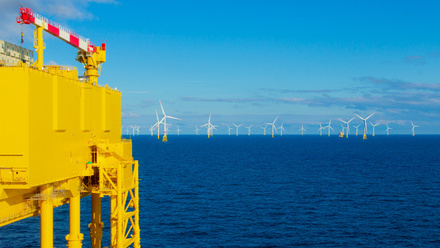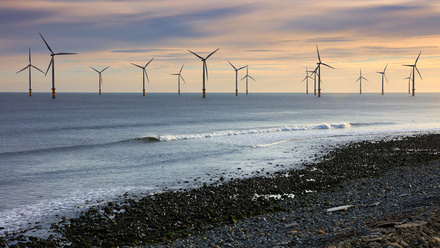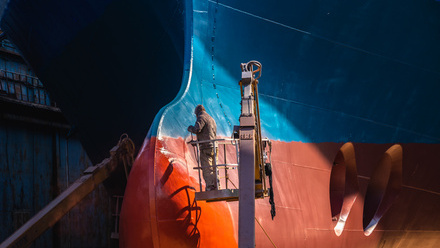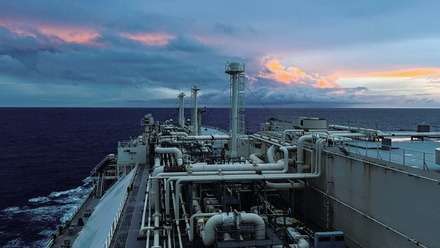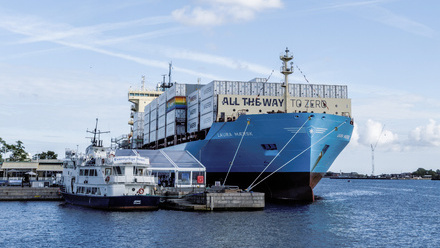Meet the ferries of the future
Stena Line develop a new concept that promises to reduce energy usage by 20% or more.
Stena Line and the Electric Orkney project are among notable sector players advancing breakthrough ferry builds expected to deliver significant carbon emissions reductions and other efficiencies.
A 240-metre roll-on/roll-off (ro-ro) concept vessel designed for transporting semi-trailers and cars, the Stena Futuro is predicted to comparably reduce overall energy usage by 20%-plus – with the carrier targeting the “lowest fuel consumption on the market”.
Featuring 40-metre, retractable wing sails, the concept includes a range of technologies aimed at lessening the vessel’s environmental footprint, including:
-
hybrid propulsion with batteries and energy-efficient engines that can run on several different fuels
-
battery power for operating partly on electricity – for example, when entering and leaving port
-
solar panels to support the vessel’s energy needs
-
an air lubrication system, where small air bubbles under the hull reduce drag
-
a waste heat recovery system, which captures heat from the engines to power heating and electricity onboard
Stena Line Scandinavia Public Relations and Media Manager Johan Live says all technologies incorporated in the design are “state of the art” while also being proven in operation.
“Air lubrication for example has been installed in over 150 vessels already, with about 300 other systems in order ” he states.
“As for the sails, this specific model may not be as commercially mature as the rest of other pieces of equipment we have been considering, but a prototype has now been produced and is functioning and the first model will soon be installed onboard a ship. Today about 60 ships have some sort of wind-assistance system.
“Sails and air lubrication are examples of technologies we are considering for other vessels. Sails will be installed on one of our new ro-ros.”
Another visually-striking feature of the concept – for which a shipbuilder is yet to be determined – is the low and streamlined design, with hull and superstructure “optimised to achieve the most efficient use of cargo space possible”. In complement, the ferry’s low weight and optimised hydrodynamics and aerodynamics are expected to be central to achieving low fuel consumption.
“Attention has been paid to reduce both the hydrodynamic drag and the aerodynamic drag, while maintaining the cargo capacity. Easy access to different parts of the vessel was studied in detail, as well as emergency exits and logistic flow,” Live concludes.
Island connectivity and emissions reduction the inspiration in Orkney
Meanwhile, the Electric Orkney Project has announced a major milestone, with the delivery of the Belfast-built Artemis EF-12 Workboat XL to its Scottish Isles base to commence trials.
Named Zevi 1, the vessel has been developed through partnership between Artemis Technologies, Orkney Ferries and the European Marine Energy Centre. The project aims to demonstrate the benefits of electric-powered hydrofoil workboats and passenger ferries to service some of the inter-isle routes in Orkney – supporting decarbonisation and island connectivity – through a three-year trial.
With a passenger capacity of 12, the vessel is equipped with “revolutionary” Artemis eFoiler technology, which is said to “significantly reduce emissions, operating costs and noise pollution, while providing a smoother, more comfortable experience for everyone onboard”.
Orkney Ferries Chair and councillor, Mellissa Thomson, describes the arrival of the hydrofoil vessel as an “important moment for Orkney and our community, and one that we’ve all been looking forward to.”
“Now the exciting work begins and we can soon see the vessel on the water going through its necessary tests. I’m confident the Electric Orkney project will provide islanders with a service that is smoother, quieter and built for the future,” she concludes.
Adds Artemis Technologies chief executive Dr Iain Percy: “Bringing the Artemis EF-12 Workboat XL to the islands supports Electric Orkney’s ongoing goal of decarbonising transport whilst improving the quality of service for residents and visitors.”
To accommodate the Zevi 1, an ultra-fast charger is being installed in Kirkwall which will provide a full charge to the 12-metre vessel in under one hour. The Electric Orkney project is expecting to soon deploy the second of its two trial vessels, the Artemis EF-24 Passenger, in another bold move towards future ferries.
Tell us what you think about this article by joining the discussion on IMarEST Connect.
Discuss this and similar topics in the Ship Energy and Environment Special Interest Group.
Image: the Stena Futuro concept vessel. Stena Line.

